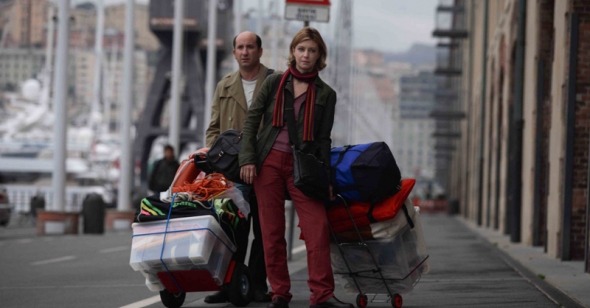The Material World
by Kristi Mitsuda
Days and Clouds
Dir. Silvio Soldini, Italy, Film Movement
In its detailing of a couple’s financial freefall after the loss of a job, Silvio Soldini’s Days and Clouds couldn’t ask for a more fittingly precipitous point in time for its American theatrical release than this disquieting summer of soaring gas prices, staycations, anxious awaiting of stimulus checks, and shuttering Starbucks. Granted, Elsa (an elegant Margherita Buy) and Michele (Antonio Albanese) start off with means far above that of the average household; the opening scenes quickly establish the extravagant lifestyle to which the married, middle-aged couple are accustomed: To celebrate the recent completion of her art-history degree, Michele takes Elsa out for dinner, gifts an expensive-looking pair of earrings, throws a surprise party, and alludes to near-future plans for a trip to Cambodia. Though she appears momentarily overwhelmed by this display of largesse, Elsa isn’t particularly discomfited. But the symbolic rude awakening—she steps out of bed the next morning onto shards of the bedside lamp broken in happy, drunken oblivion the night before—is made actual when Michele confesses that, not wanting to distract from her final exam studies, he didn’t reveal sooner that two months prior his business partners pushed him out of the company he co-founded.
The majority of us can’t relate to the Oliveris’ former level of material comfort, but their alarmingly swift descent into dire straits, and attempts to scale back on expenses and lower expectations in the search for employment, strikes closer to home. Elsa takes an active, matter-of-fact approach; she gives up the restoration work she does for love (but not money) and accepts two positions (including one in that most despised of sectors—telephone solicitation), while Michele wrestles with a pride so entrenched from years of calling the shots that he remains nearly incapacitated by his humiliation. As each increasingly takes out their fears and frustrations on the other, as well as on their 20-year-old daughter, Alice (Alba Rohrwacher), Days and Clouds gets under the skin of the ways personal economic difficulties can wreak havoc on relationships.
But at other times, the movie squanders chances for real-life resonance by focusing on underlined and too easily anticipated moments of reckoning (i.e., Michele being spotted performing a menial temp job by Alice) while letting escape numerous instances that might be mined for more nuance. For so much emphasis being placed on the Oliveris’ attempts to keep up appearances, for example, encounters with friends provide scant illumination into the characters or their milieu, though surely the situation—which entails not only the selling off of the house and skipping out on social functions but also a steady movement of the couple into the working class which once served them—sends tremors through the well-to-do circles in which they run.
A compelling narrative strand arises out of this downward mobility as Michele starts taking on renovation gigs around the apartment building in which he and Elsa now live, along with two of his former employees. His apparent gratification with the work, and subsequent depression upon being left behind when his new compatriots find steadier jobs, takes Days and Clouds in an intriguing direction. But Soldini (also co-scripter) can’t help himself; instead of exploring this further, he packs the narrative with contrived moments which lead Michele to abruptly adopt a beatific countenance as he discovers What Really Matters: Family and Love. (Caution: spoilers ahead). This, after a fight with Elsa sends him to Alice’s apartment. Forced to accept the hospitality of the girl’s boyfriend—his disapproval of whom has been the source of constant arguments between father and daughter throughout—Michele discovers that, hey, the guy isn’t so bad after all. After sharing a similarly schematic moment with his own father, Michele naturally makes his way back to Elsa.
As in his earlier middlebrow art-house crowd-pleaser, Bread and Tulips, where a discontented housewife’s abandonment of her family is met with uncomplicated celebration come the conclusion, Soldini again funnels his thorny story down to the simplistic moral that love saves the day. Whereas such an ending in Bread and Tulips can at least be dismissed as of a piece with its silly, light-hearted approach, the same pat and sentimental summation applied here smacks falsely when rubbed up against the tough times Days and Clouds sometimes seriously portrays.
